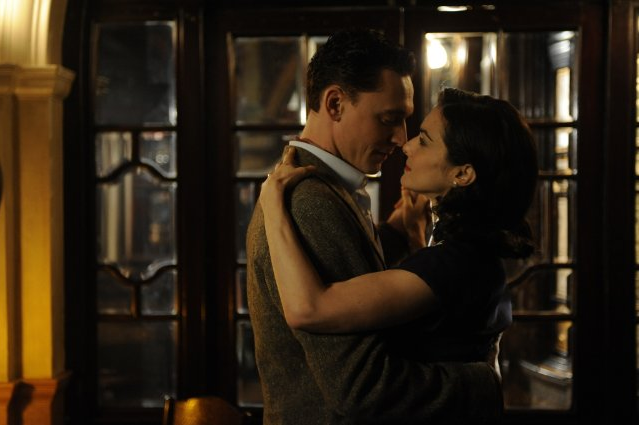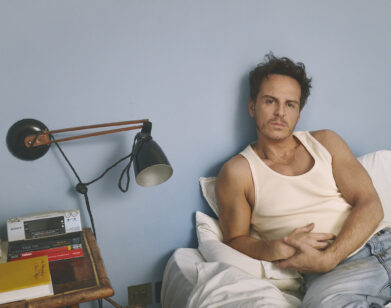Terence Davies Dives In

ABOVE: TOM HIDDLESTON AND RACHEL WEISZ IN TERENCE DAVIES’ THE DEEP BLUE SEA.
A film by Terence Davies will often feel like a dream. The Deep Blue Sea, an adaption of the play by Terence Rattigan, written and directed by Davies, is not just the story of a doomed relationship but the memories of one. Told in flashbacks over one day, the film follows the suicide attempt of Hester (Rachel Weisz), who has left her listless marriage to shack up with a young war-hero Freddie (Tom Hiddleston), who can’t provide all she needs. Davies uses the source material to ruminate on the meaning of love and the complications of desire, in what is a sad but ultimately revealing and uplifting film.
Interview spoke with Davies about his working methods, adapting The Deep Blue Sea, and why he doesn’t like acting.
CRAIG HUBERT: Do you think of yourself more as a writer or filmmaker?
TERENCE DAVIES: That’s hard to answer; I think I’m both. They’re two different disciplines, but I see them as part of the same. I see them as both equal.
HUBERT: Do you enjoy one of the two disciplines more than the other?
DAVIES: They each have different drawbacks. Writing can be very lonely. Sometimes you think, “Why has it taken five days for a transition that will take place over four seconds? Why can’t it come a bit quicker?” The direction, I think, is harder. You have to be aware of atmosphere on a shot-by-shot basis. That’s a strain. You don’t want to be seen directing them, but guiding them. They’re human beings; they get out of the wrong side of the bed, that whole thing. You have to feel it. Anytime you see and hear the film in your head it’s perfect, everything goes well: the actors give the performances on the first take, you put the thing together, and the first cut works. Of course, that whole thing is a fairy tale. It never happens like that. So there are joys and, not joys, doing both. [laughs]
HUBERT: You said you already know every shot before shooting. Is that the usual way you work? Do you always have the visual elements mapped out before you begin?
DAVIES: I’ve always had to see it from the very first script I wrote, when I knew nothing. I write it as I see it and hear it. I’ve never done a storyboard because I can’t draw, that was the only reason. The storyboard is the way in which it’s written. That way I go into a set knowing every shot. That means if something doesn’t work you’ve got a bedrock to come back to: “This precedes it, this comes after it, I think it will work if we just do a two shot there, or just have a single.” But again, it’s something that’s felt. Like actors will do things they hadn’t thought of. In a way, a director does that, to a certain extent. That’s what’s exciting. You see it and hear it in your head and then you actually have to get on set and there are real people doing these things. So that changes it, very often for the better. They have to give the performances, I can’t. That’s the magic, that’s the journey.
HUBERT: Does the music, which is essential in your films, come early as well?
DAVIES: Yes. I’ve loved the Barber for many years. The irony with any music I choose is that, usually before shooting it plays all the time. For ages, the Barber never got played; in London, it was played five times just before shooting in various concerts. I thought, “Oh God!” I’m glad it was, because it’s a great concerto, but I thought, “Oh Lord, it’s going to be more expensive.” The film was £2.5 million, we shot in 25 days. If the money we had to pay for the Barber was enormous, I couldn’t afford it. I don’t know what we would have done, because I just think it’s perfect. It’s an instinct. The first thing I say is, “Look, before you do anything, clear the music.” If they can’t clear it, I’ll look for something else. There’s always something else. Sometimes not getting permission has been better. That’s in the luck of the gods.
HUBERT: This is the first play you’ve adapted, although you’ve adapted two novels previously. How does the adaption process differ from writing original material?
DAVIES: It’s a different sort of process. When it’s your own, what it is—certainly in the autobiographical films—is what to leave out. Had I put everything that happened, nobody would have believed it. Particularly in Distant Voices, Still Lives, because my father was psychotic. The number of stories my siblings told me, and what I experienced as a child—nobody would have believed it. The other worry was offending my family. With someone else’s material, you have an aesthetic distance on it straight away, but then you have to make it into a film. With this particular play, and it’s true of all his plays, he puts the exposition in the first act, all of it. I just aesthetically don’t like that; why photograph somebody telling you when you can show it? It’s got to be from Hester’s point of view. The first act is collapsed into the first nine minutes. And Rattington was not good at working-class people. He was from a privileged background. He never lived in a bedsit in Ladbroke after the war. He was living in The Albany, which was very posh. So it was making those characters real characters, but by cutting them down. When you cut them down, they become stronger. Particularly Mrs. Elton—in the play, she functions as a mouthpiece, she tells you everything. In the film, she doesn’t, but she does tell you important things of the period which are not in the play. When she finds out Freddie and Hester and living together, she says, “I run a respectable house, I don’t want any trouble.” Those days, that meant with the police. Also, in Britain during that period, it was an offense to attempt suicide; you could go to prison for it. To have two people living together, unmarried, was unusual. Mrs. Elton is shocked by that but prepared to accept it, provided there’s no trouble. Mrs. Elton is also the one who provides Hester with a definition of real love. Suicide, nobody’s worth it. And she’s right, she’s right. But it’s a working-class woman who tells Hester, not somebody else.
HUBERT: In the play, Freddie comes off as less sympathetically than in the film. He’s more charming, less mean-spirited, in the film.
DAVIES: Also the way in which he’s written in the play. It was everywhere, in theater and film, people saying, “Old boy!” all the time. You want to strangle them; it’s so tedious. [laughs] They sound like two middle-aged men, and they’re not. It’s just after the war; they would have been 18 years old. They’re not middle-aged men! Also, because they actually survived the war, that’s a big deal. They helped save Britain. Freddie survived the war and comes back to a society that was absolutely bankrupt.
HUBERT: What do you look for in an actor?
DAVIES: The first thing is I don’t want you to act. I find acting, especially British acting, dead, quite frankly. The nature of acting has changed; people shout and cry all the time and fire guns at one another. There’s nothing interesting about this. They’re ordinary people and they’ve got to be ordinary people. That means you’ve got to feel it, not be it—not act it. I can tell a false emotion or false gesture and say, “Don’t do that, it will spoil it.” The wonderful thing is when you get actors who don’t act. There’s something wonderful about that because it’s much truer. All the actors rose to that. But I don’t like acting. [laughs]
THE DEEP BLUE SEA IS OUT IN LIMITED RELEASE TODAY.






